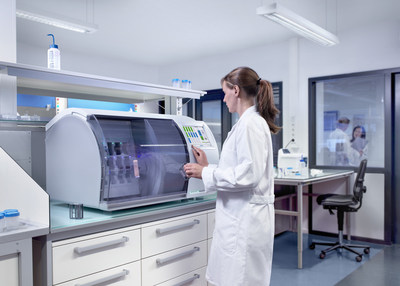AMSTERDAM, April 13, 2017 /PRNewswire/ -- Royal Philips (NYSE: PHG, AEX: PHIA), a global leader in health technology, today announced it has received regulatory clearance (via De Novo classification) from the U.S. Food and Drug Administration (FDA) to market its IntelliSite Pathology Solution, a comprehensive digital pathology system designed to meet the challenges of today's pathology lab.

As the first and currently only digital pathology solution in the U.S. to receive clearance for primary diagnostic use, the technology can aid pathologists to view and diagnose digital images of surgical pathology slides. Digital pathology aims to reduce pressure on pathology services by streamlining workflow and extending collaboration with the aim of increasing diagnostic confidence.
"The clearance for Philips IntelliSite Pathology Solution marks a major milestone for innovation in pathology services in the U.S.," said Russ Granzow, General Manager of Philips Digital Pathology Solutions. "Not only will it promote increased efficiencies and collaboration between pathologists, but it also opens a complete new dimension towards computational pathology which aims to increase accuracies and ultimately enhance patient care."
The FDA evaluated data from a clinical study of approximately 2,000 surgical pathology cases. This was one of the largest studies ever conducted to directly compare the use of digital pathology to optical microscopes. Sixteen pathologists at four clinical study sites Cleveland Clinic, University of Virginia, Miraca Life Sciences and Advanced Pathology Associates conducted approximately 16,000 reads across 2,000 cases. FDA's news release 'FDA allows marketing of first whole slide imaging system for digital pathology' can be found here.
Pathology services are under pressure to meet the increasingly complex demands of cancer care. As the number of cancer cases continue to grow [2], the complexity and number of tests have simultaneously increased to support improved patient care [3]. Pathologists must work as efficiently and effectively as possible to analyze the complex information that influences the design of personalized treatments. Outside the U.S., where CE-IVD mark has allowed primary diagnosis since 2014, digital pathology is recognized for increased efficiencies in the logistics and consultation needs in primary diagnosis of histopathology images [4][5].
Philips IntelliSite Pathology Solution is an automated digital pathology image creation, viewing and management system comprised of an ultra-fast pathology slide scanner, an image management system and a display. This solution is complemented by advanced software tools to manage the scanning, storage, presentation, reviewing, and sharing of information. By supporting the transition to digital workflows, Philips seeks to help pathology laboratories simplify access to histopathology information and help staff work more efficiently.
As a leader in the field, Philips is a driver of the adoption of digital pathology, as it is a critical step towards the advancement of the pathology services industry. It also holds promise for enabling the more widespread use of computational pathology tools with far reaching implications such as image analysiswhich could support increased accuracies, predictive health management and better patient outcomes.
Recently, Philips announced further additions to its portfolio of pathology solutions, including expanded offerings in computational pathology to further empower pathologists throughout their routine work. To learn more about Philips' innovation in digital pathology, visit Philips Digital Pathology Solutions website and follow @Philips_Path.
[1] De novo classification is the regulatory pathway for marketing clearance for novel, low- to moderate-risk medical devices that are the first of their kind.
[2] International Agency for Research on Cancer and Cancer Research UK. World Cancer Factsheet. Cancer Research UK, London, 2014.
[3] Testing Times to Come: An Evaluation of Pathology Capacity Across the UK. Cancer Research UK, London, 2016.
[4] Digital First: Clinical Transformation through Pathology Innovation. NHS National Pathology Programme, Department of Health; London, 2013.
[5] Baidoshvili, A. (2017, March 1). The benefits and challenges of digitizing your workflow [Webinar]. Retrieved from tissuepathology.com
For further information, please contact:
Hans Driessen
Philips Digital Pathology Solutions
Tel: +31 6 10610 417
E-mail: hans.driessen@philips.com
Steve Klink
Philips Group Press Office
Tel. : +31 6 10 8888 24
E-mail : steve.klink@philips.com
About Royal Philips
Royal Philips (NYSE: PHG, AEX: PHIA) is a leading health technology company focused on improving people's health and enabling better outcomes across the health continuum from healthy living and prevention, to diagnosis, treatment and home care. Philips leverages advanced technology and deep clinical and consumer insights to deliver integrated solutions. Headquartered in the Netherlands, the company is a leader in diagnostic imaging, image-guided therapy, patient monitoring and health informatics, as well as in consumer health and home care. Philips' health technology portfolio generated 2016 sales of EUR 17.4 billion and employs approximately 71,000 employees with sales and services in more than 100 countries. News about Philips can be found at www.philips.com/newscenter.

To view the original version on PR Newswire, visit:http://www.prnewswire.com/news-releases/philips-receives-fda-clearance-to-market-philips-intellisite-pathology-solution-for-primary-diagnostic-use-in-the-us-300439329.html
SOURCE Royal Philips





